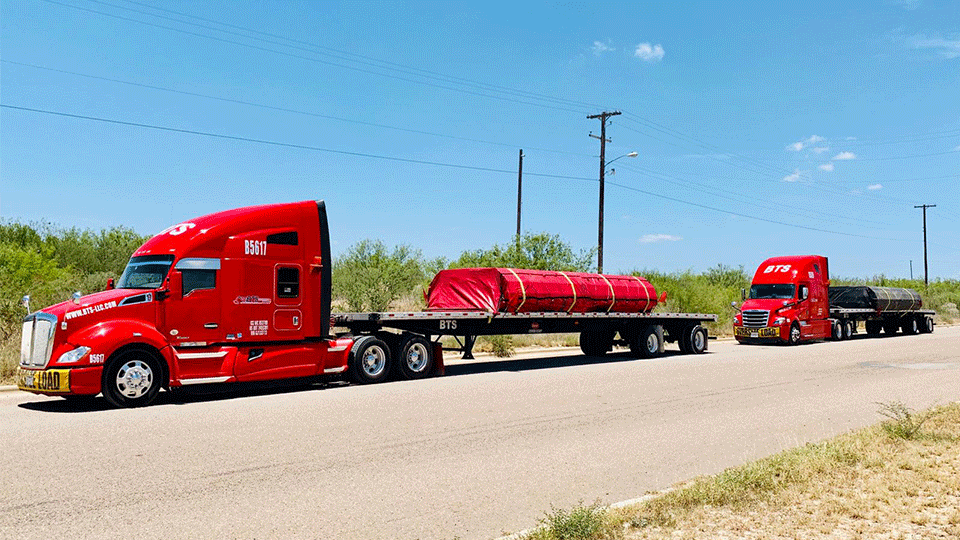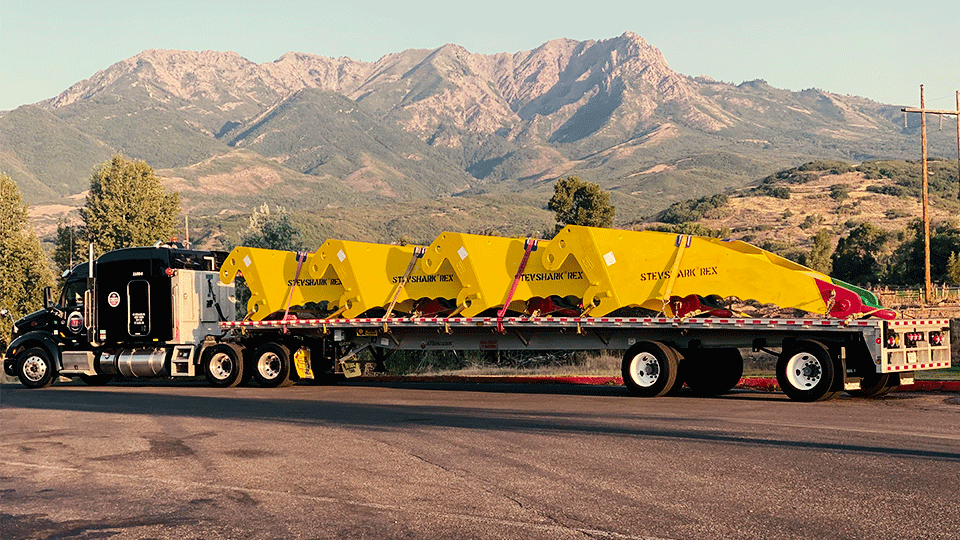
Each of your shipments is important to the success of your business. That’s just a fact. Over the years, your company has developed systems for finding, vetting, selecting and tendering freight to transportation companies.
Having a great pool of brokers to lean on can be really beneficial, particularly during peak seasons and for projects. You know this.
In the interest of simplifying things, however, sometimes you look to parse down the number of providers you use — particularly for one-off projects or momentary outbound surges. This is a good strategy; allocating a batch of shipments to a single transportation provider can be expeditious, price effective and easier to oversee.
In fact, as you may (or may not) be aware, there are seven advantages to using a single freight brokerage for project freight shipments.
But where should you draw the line?
How many shipments can a freight brokerage realistically handle out of one location in a day?
At what point does it make sense to add another provider?
These are important questions.
You want to realize the benefits of working with a single broker for an upcoming project, you’re just not sure if your volumes are too high. You can’t risk delays because you’re asking one broker to handle more than it's capable of. . . Should you break it up a bit and use multiple providers instead?
At ATS Logistics, we’ve spent decades providing transportation services to companies (of all sizes) around the globe. Often, our teams are tasked with handling a customer’s transportation project from beginning to end.
As a result, we firmly understand the factors influencing the number of shipments a freight brokerage company can realistically cover out of a location in a day.
Understanding your transportation provider’s capabilities is vital for setting realistic expectations for their performance. This will also help you make well-informed plans for your supply chain.
In this article, you’ll learn about the major factors that influence how many loads a broker can reliably cover out of an origin in one day. These factors are:
- The origin location
- How many trucks the shipper can load in one day
- The freight broker’s size
- The type of transportation equipment that’s required
- The amount of lead time provided
Near the end, we’ve also included a list of things you can do, as a shipper, to increase the number of loads your brokerage can handle in a day.
Factor #1: The Origin Location
Freight brokers offer transportation services in a unique way: as third-party providers. While there are a number of ways for a freight brokerage to be structured, every brokerage is reliant on its relationships with trucking companies and truck drivers.
If your freight broker doesn’t have existing partnerships with trucking companies in your freight’s origin, it doesn’t matter how many shipments you need to move out of it — that brokerage can’t help you.
Luckily, the best freight brokerages know their areas of strength and stick to them. In doing so, your freight brokerage probably has an array of carrier partners around your origin, allowing them to line up trucks with (relative) ease.

That said, generally speaking, some locations are easier to provide capacity in than others. Manufacturing hubs like Detroit and Chicago, for example, tend to have higher freight volumes and, in turn, more truck drivers — who like to stick around places where freight demand is high.
In these types of origins, it’s not unreasonable to expect a well-run brokerage to provide 40 trucks or more in a day.
This number dwindles quite quickly, however, in locations with the following characteristics:
- Remote locations
- Mountainous regions (especially during winter)
- Locations without much outbound freight
Since locations like these don’t present a consistent opportunity for trucking companies to find a shipment, lining up a stream of drivers in one day can be tricky — limiting a broker’s ability to do so.
Related Content: Load-To-Truck-Ratios: an Overview of How They Impact Your Freight Rates
Factor #2: How Many Trucks The Shipper Can Handle in a Day
The overall volume of trucks in your area makes a significant impact on a freight broker’s ability to meet your outbound demands. That said, the number of trucks you can load in a day also matters.
In some situations, it’s realistic for a great brokerage to line up hundreds of trucks in one day. This doesn’t do any good, however, if your shipping crew(s) can only load 10 trucks per day.
Whether your company operates on a first-come-first-serve (FCFS) or appointment-based schedule, it’s important to relay this information to your brokerage along with estimations on how quickly you expect to load each truck.
With this insight, your broker can accurately inform each inbound truck driver about timelines and adjust the number of drivers they route to your location at one time.
Factor #3: The Freight Brokerage’s Size
As mentioned in our first point, freight brokers build out a carrier network by thoroughly vetting and developing relationships with individual trucking companies.
Doing this right takes attention, regular communication and careful oversight.
Developing strong, lasting partnerships with trucking companies often requires the employment of operations professionals. At ATS Logistics, for example, these are our carrier representatives.

Since there are only so many hours in the day, a single employee can maintain a fixed number of carrier relationships.
Although the best carrier representatives juggle hundreds of these relationships, the fact remains: Larger freight brokerages can employ more operations professionals to manage a wider carrier base.
For this reason, to answer the question “how many loads can a freight brokerage handle out of one location in a day?” you need to consider the broker’s size.
It’s reasonable to expect a large freight brokerage to have more existing relationships in your origin, giving them access to greater capacity and increasing the number of trucks they can supply you in one day.
Factor #4: The Type of Transportation Equipment That’s Required
Supply and demand influence many aspects of the transportation marketplace. Simply put, the supply of available trucks and the demand for their services within an area drive the rates shippers pay for transportation services.

This is one reason why, generally speaking, specialized open-deck freight is more expensive to ship than dry van cargo — there are far more dry van truck drivers (and trailers) than specialized drivers and trailers.
As a result, your freight broker’s ability to feed you solutions hinges on the kind of transportation equipment you require. Often, there simply aren’t as many step-deck or lowboy trailers as there are flatbeds in an area.
Examples of trailer types that are typically more accessible:
- Dry van trailers
- Flatbed trailers
- Reefer trailers (to an extent)
- Step-deck trailers (to an extent)
Examples of trailer types that are usually more sparsely available:
- Conestoga trailers
- Lowboy/double-double drop trailers
- Extendable drop deck trailers
- Curtainside trailers
- Extendable double-drop (RGN) trailers
- Multi-axle heavy haul equipment
If you require specialized equipment, it will take more pre-planning and expertise for your broker to meet high-volume demands.
Factor #5: The Amount of Lead Time Provided
Time is money in many businesses — the transportation industry included.
Since trucking companies and their drivers only make money when their wheels are moving — and have limited hours each day to move — they like to schedule out their services days into the future. As a result, as your pickup date approaches, the number of unbooked truck drivers in/around your origin will dwindle.
On short notice, your freight broker has fewer viable carriers to turn to. This limits their ability to supply trucks at reasonable price points (they may need to overpay to secure your capacity).
Adequate lead time (72 hours or more), will substantially increase the volume of trucks your freight brokerage can provide. Beyond working with drivers currently in your area, your brokerage can coordinate with its carriers and route trucks toward your door in time for each pickup date/time.
So, if you provide a good amount of lead time, the number of trucks your broker can supply in a day will increase substantially.
What Can You Do to Ensure a Broker Can Meet Your Outbound Freight Needs?
In many situations, it’s not unreasonable for one freight brokerage to supply every truck you need in a day — even if you feel like you’re asking a lot.
For coordination, visibility and administrative purposes, using a single freight brokerage to cover all of your shipping needs can be really convenient.
Here are some things you can do to ensure your broker can meet your demands:
- Give adequate lead time (as much as you can)
- Understand your shipping department’s turn time for loading trucks
- Communicate your facility’s hours of operation and schedule
In the end, the more work you do — alongside your freight brokerage — and the more visibility you give them in the planning stages of your project/peak season, the better off you’ll be.
Related Content: Project Freight Pickup and Delivery Planning Guide
Use This Tool to Choose the Best Freight Broker for Your Business
Now you know how factors like lead time, your freight’s origin, the size of your broker, the equipment type(s) you need and your loading cadence all impact the number of trucks your broker can supply you in a day.
Use this information to set expectations and plan going forward. It’s not unreasonable to expect a great brokerage to cover all of your outbound needs in a day.
That said, with so many registered freight brokers in the U.S. (more than 31,000) deciding which ones to trust with your business can be difficult.
To help you make these discernments, download this free Freight Brokerage Selection Checklist and use it to vet your brokers going forward. While there are plenty of great brokerages, not all of them are cut of this cloth. With those 26 questions in hand, you’ll be able to make quality-conscious decisions going forward.
Finally, here at ATS Logistics, we have a nationwide carrier base that’s ready to meet your needs. If you’d like more information about our services, check out this page where we’ll answer many of your questions. You can also get in touch with us here — we have a transportation professional standing by to help you become the supplier that always delivers for its customers.





